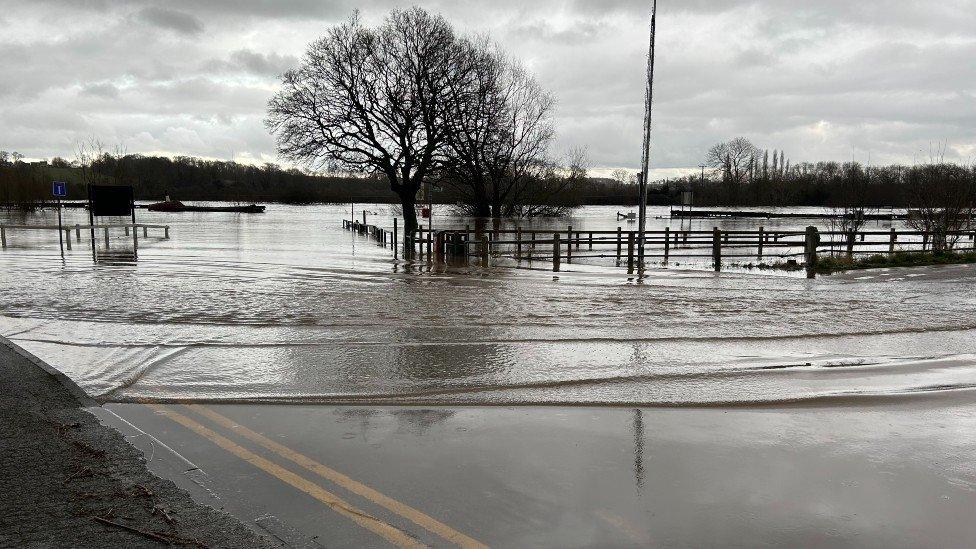England flooding: Hundreds of homes evacuated after heavy rain
- Published
Watch: Horses rescued and homes submerged as floods hit UK
Hundreds of homes have been devastated by flooding in England following a powerful storm and a week of heavy rainfall.
There are more than 230 flood warnings, external in force, the majority in the Midlands, East Anglia and southern England, with many residents forced to evacuate their properties.
Flooded roads and railway tracks are bringing more delays for travellers.
A major incident has been declared in Nottinghamshire around the River Trent.
Many living close to the river have had their homes and businesses ruined, while major roads have been cut off in some areas with emergency services reporting difficulties in attending incidents.
The Environment Agency said the Trent's levels were some of the highest seen in 24 years.
It peaked at 5.35m, just shy of the record set in 2000, when the river reached 5.5m in height.
The agency's executive flood director, Caroline Douglass, told BBC Breakfast hundreds of properties had been flooded in England overnight into Friday.
Some 50 properties on Alney Island in Gloucester had been evacuated, she added.
"Over November and December, following Storm Babet and Storm Ciaran, the ground was incredibly saturated right across the country, particularly in the east," Ms Douglass said.
"That's been topped up over the pre-Christmas period [and] that rainfall from this week has just added to that, so there's nowhere for the water to go."
The past week saw parts of the UK affected by Storm Henk, which was the eighth named storm in three months, although the current spell of wet and windy weather is set to be replaced by cooler and drier conditions.
The UK Health Security Agency has issued a cold weather alert for the coming days and warned that temperatures are set to plummet. The yellow cold weather alert for all of England comes into force at 09:00 GMT on Saturday and expires at noon on 12 January.

Earlier on Friday, Nottinghamshire County Council said more than 100 homes in the county were among those hit by flooding, but warned the number could rise.
Around 50 people were led to safety by firefighters overnight after a canal burst its banks in Hackney Wick, east London, causing flooding in an area of around 10 acres.
A party boat moored at Temple Pier on the River Thames sank on Thursday during heavy rainfall.
In Bath, the famous Pulteney Weir on the River Avon has been completely submerged. One Pulteney Bridge shop owner told the BBC he has "never seen it so high".
Meanwhile, Prime Minister Rishi Sunak is facing calls from opposition parties to visit areas hit by flooding.
Mr Sunak said he had spoken to residents affected by flooding in the East Midlands but did not commit to seeing the situation for himself.
"I just want people to be reassured that the Environment Agency has people on the ground in all the affected areas, also hundreds of high volume pumps are in practice right now making a difference," he said.
Labour has accused the government of being "asleep at the wheel" over flood warnings and said it should convene an urgent "Cobra-style taskforce" to protect homes from further damage.
The BBC has been told there are no plans to hold a Cobra meeting. A government source said Environment Secretary Steve Barclay was being updated by the Environment Agency.
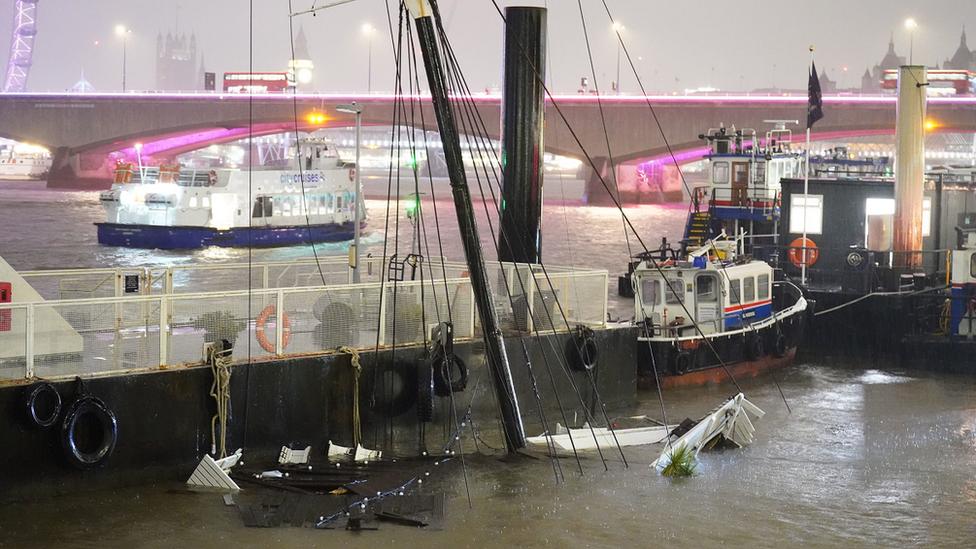
A HM Coastguard spokesperson said everyone had been accounted for after the Bar & Co boat sank
The Environment Agency, which issues flood guidance for England, said ongoing impacts from this week's rainfall were likely across much of the country over the next five days.
The highest rainfall totals recorded on Thursday were 35.2mm in the village of Otterbourne in Hampshire, while between 20 and 30mm fell across much of southern England.
Wattisham, a village in Suffolk, has this week already surpassed its monthly January average for total rainfall.
Train companies have warned that flooding is impacting on services.
Great Western Railway is warning passengers to travel early and advising customers to check their journey beforehand.
Pub owner Andy Goodall stands in the floodwater while holding a pint
Localised flooding has caused lines to be blocked between Reading and Taunton and between Swindon and Bristol Parkway affecting travel to and from South Wales and south-west England.
South Western Railway's route to Devon has also been affected by the weather, after a landslip at Crewkerne in Somerset led to the firm advising people not to travel. It now says services will resume on Saturday.
Experts say a warming atmosphere increases the chance of intense rainfall and storms.
However, many factors contribute to extreme weather and it takes time for scientists to calculate how much impact climate change has had on particular events - if any.
The world has already warmed by about 1.1C since the industrial era began and temperatures will keep rising unless governments around the world make steep cuts to emissions.

Do you live in a region affected by the adverse weather? Share your experiences by emailing haveyoursay@bbc.co.uk, external.
Please include a contact number if you are willing to speak to a BBC journalist. You can also get in touch in the following ways:
WhatsApp: +44 7756 165803
Tweet: @BBC_HaveYourSay, external
Please read our terms & conditions and privacy policy
If you are reading this page and can't see the form you will need to visit the mobile version of the BBC website to submit your question or comment or you can email us at HaveYourSay@bbc.co.uk, external. Please include your name, age and location with any submission.
Related topics
- Published5 January 2024
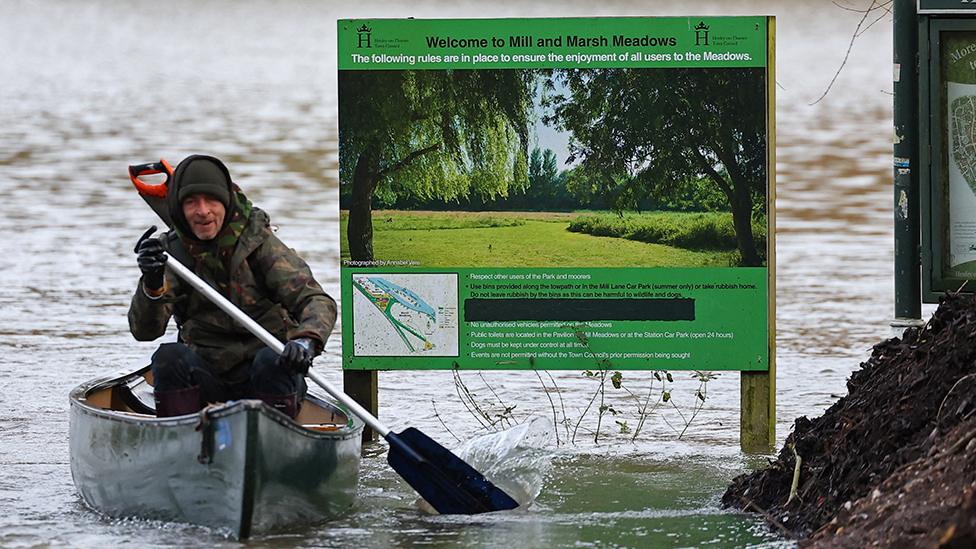
- Published5 January 2024
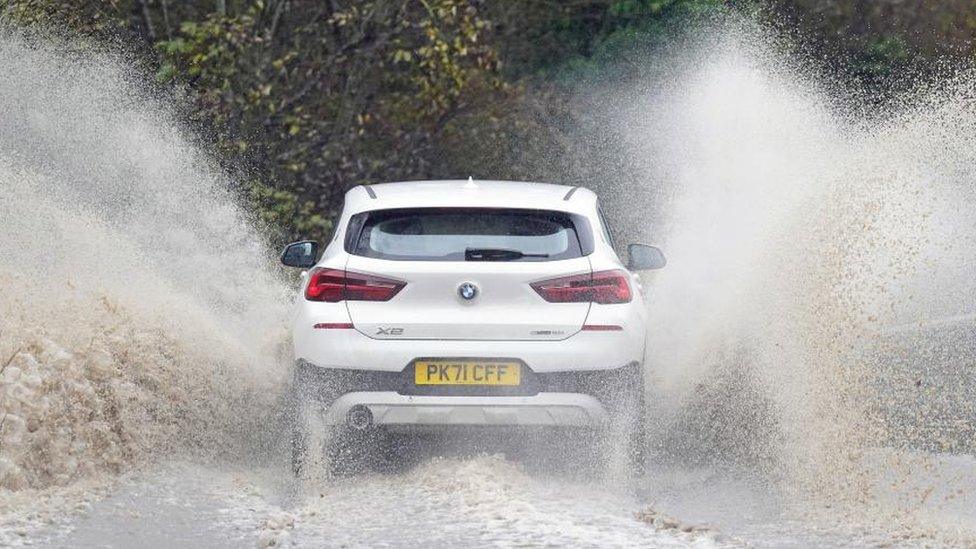
- Published5 January 2024

- Published4 January 2024
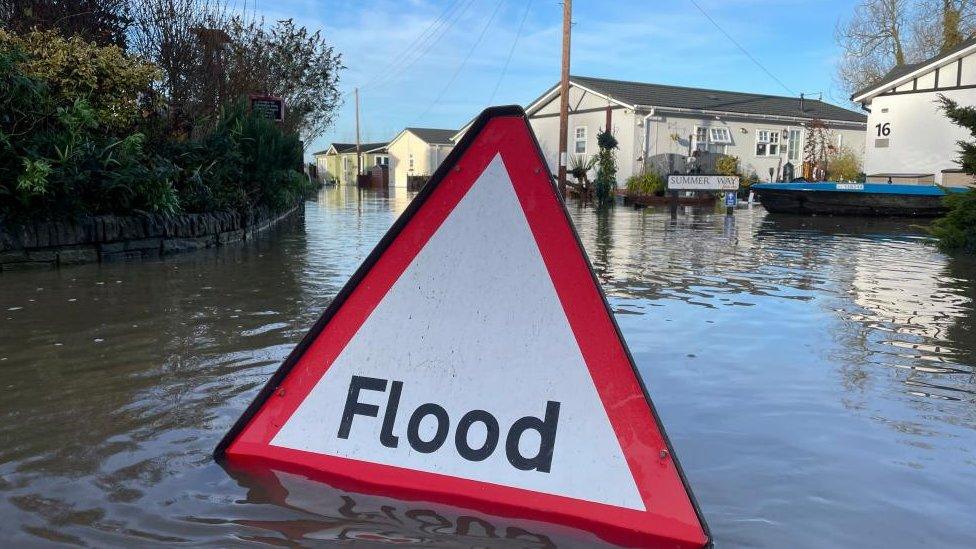
- Published4 January 2024
